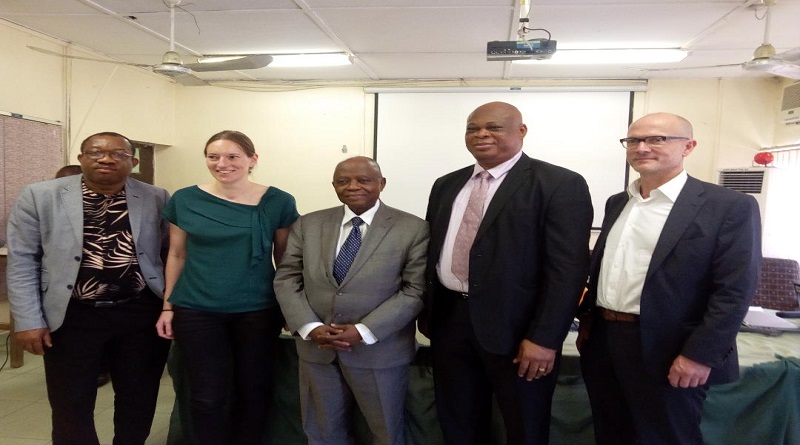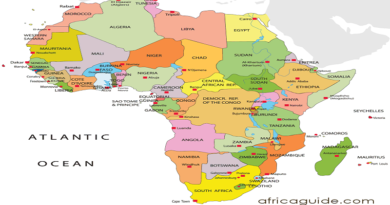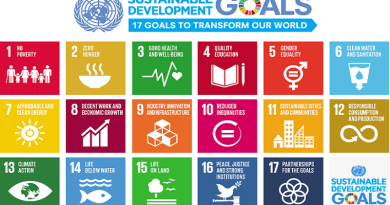Why sales of used lead acid batteries need to be regulated- Stakeholders
Picture Caption: L-R. Executive Director SRADev Nigeria, Dr. Leslie Adogame; Petra Sorge from Oko-Institut Germany; Chairman, WAMASON, Prof. Oladele Osibanjo; General Manager, LASEPA, Engr. Antonio Ayodele and Dr. Tobias Eisenhut from Oko-Institut, Germany at the celebration of WHO International Lead Poisoning Prevention Week of Action held on Thursday October 25, 2018 at LASEPA Conference room, Alausa, Ikeja, Lagos.
Stakeholders in the environment and human health sector have stressed the need to regulate the sale of used lead acid batteries in Nigeria because of the danger it poses to human and the physical environment.
The call came on Thursday October 25, 2018 at a day-long seminar put together by the Lagos State Environmental Protection Agency (LASEPA) in conjunction with Sustainable Research and Action for Development (SRADev Nigeria) to celebrate World Health Organisation (WHO) International Lead Poisoning Prevention Week of Action 2018.
Participants also resolved that there need for funds to enhance provision of monitoring vehicles, tool kits, advocacy; that there should be synergy between the state and federal governments to regulate activities of stakeholders across the leaded products distribution chains; that there is need for capacity building through provision of training and funding for LASEPA officials and for the agency to initiate collaboration with the Federal Ministry of Environment to advocate issues of lead in consumables at the highest level.
Besides, participants observed that the international body has banned lead in paint but it is still found in Nigerian paints, adding that soils around Used Lead Acid Battery (ULAB) facilities is heavily polluted with lead.
Also, that the enforcement of laws that pertains to chemical management in Nigeria is weak and that lead pollution is trans-boundary spreading across the different environmental media while research has proven that there are alternatives uses to lead slag.
In his welcome address at the workshop held at LASEPA conference room, Alausa, Lagos, General Manager of the agency, Mr. Antonio Ayodele, an engineer, said lead is available in several ways to man, particularly lead in paint which has been banned international but still found in Nigeria.
He stressed that the side effect of it is a thing that anyone poisoned by it will nurture it through his or her life time.
While presenting his paper on “The role of government and effort in lead pollution prevention in Lagos State”, the LASEPA boss said the agency has a major role to play that centre on pollution control and development of the environment.
Ayodele said though advocacy on the arm of lead to human and the environment is still low and that what a lot of people see in used lead acid battery is business.
Executive Director, SRADev Nigeria, Dr. Leslie Adogame, said the week (October 21-27) is WHO week of action to raise awareness on dangers of exposure to lead poisoning and to offer solutions.
He said SRADev has been in the process since 2006 and the organisation is recognised to represent other non-governmental organisations on chemical management in Nigeria.
Adogame added that the workshop is a take off point to be followed by visits to some communities where lead acid batteries are being recycled.
Assistant Director and Head, Hazardous Materials Management, LASEPA, Mr. Jagunna Adebayo, said this is the first time LASEPA is celebrating the lead in paint week. He added that the agency has done a lot and that there are some paints in Lagos that does not contain lead.
Jagunna who commended SRADev for partnering with the agency, called for more collaboration with other partners.
Executive Secretary, Paint Manufacturer Association of Nigeria, Mr. Jude Maduka, said lead in paint comes from raw materials which 80% are imported into the country which is common in protective paints.
He said, “We are ready to comply”. He called on the government to create a conducive environment to make things work.
Chairman, Waste Battery Recyclers Association of Nigeria, Chief Vincent Nwodo, said it’s only in Lagos State that they have the association of people that recycle batteries.
Nwodo, who commended the state government for the efforts of LASEPA, urged the government to strengthen its enforcement arm so as to detect illegal recyclers and guide operations in the sector.
Chairman, Waste Managers Association of Nigeria, Prof. Oladele Osibanjo, said the workshop is critical to sensitize Nigerians on lead acid battery but there is no regulation of the sector.
The workshop attended by LASEPA officials, non-governmental organisation, and media among others was attended by Dr Tobias Eisenhut, a paediatrician from Germany and Petra Sorge, also a German.
The event, which culminated in a technical session, was supported by Ban Lead Paint, European Journalism Centre and the Bill and Melinda Gates Foundation.




